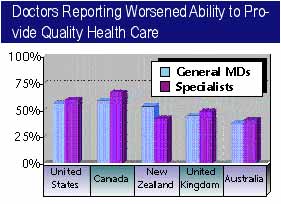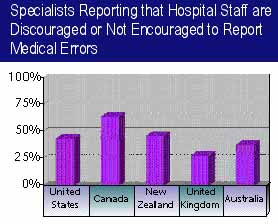More than half of all U.S. physicians (and a high percentage of doctors in four other
English-speaking countries) believe their ability to provide quality health care to patients has  deteriorated over the past five years, according to a recent international survey of doctors conducted by the Harvard University School of Public Health and
The Commonwealth Fund. deteriorated over the past five years, according to a recent international survey of doctors conducted by the Harvard University School of Public Health and
The Commonwealth Fund. "These findings are alarming," says Robert J. Blendon, the professor of health policy and political analysis at Harvard University who conducted the
survey. "What's worse is that many doctors in all five countries fear this decline in quality will continue." Despite increased spending and
technological advances, The Commonwealth Fund 2000 International Health Policy Survey of Physicians reveals that fewer than one in six U.S. doctors believes his or her
ability to provide quality health care has increased. More frightening, the majority of them believe that health care quality will continue to decline during the next five years.
Following reports of startling preventable-medical-error statistics, physicians in all five countries give hospitals low marks for finding and addressing such errors. With the
exception of the United States (where the number was about a third), approximately half of all specialists surveyed rate hospitals as fair or poor on medical-error tracking systems.  Among other findings, the survey shows physician concern with the
difficulty of keeping up with the latest advancements in their fields, the cost of health care and limited time with patients. Among other findings, the survey shows physician concern with the
difficulty of keeping up with the latest advancements in their fields, the cost of health care and limited time with patients.
"Doctors' concerns sound a wake-up
call," says Blendon. "The good news is that [doctors] don't view the situation as irreversible and offer concrete suggestions for improvement."
Suggestions the surveyed physicians put forth for improving the quality of health care include spending more time with patients, providing better access to
specialized medical care and prescription medications, improving systems for reducing medical errors, and providing better post-visit nursing or home care.
A substantial number of physicians in all five countries, including majorities in Australia, New Zealand and the United Kingdom, also endorsed electronic methods of prescribing
medications and maintaining patient medical records as "very useful." The majority of doctors in all five countries additionally report that releasing information to the public
about the quality of care provided by hospitals is a highly effective means of improving care quality.
Despite the problems physicians see with their respective health systems, the Commonwealth survey finds that physicians are more satisfied with their country's
health care system than is the public in each of the five countries. When asked in 1998, 14 percent to 33 percent of the public in the five countries called for a complete
rebuilding of their health care system. In the same study, however, less than 12 percent of primary care physicians and less than 8 percent of specialists across all five countries
called for a complete rebuilding of the system. Perhaps not surprisingly, the great majority of doctors in all five countries also reported that they were satisfied with their
own medical practices.
Between April 27 and July 27, 528 practicing generalists and specialists in the United States, 517 in Australia, 533 in Canada, 493 in New Zealand and 500 in the United
Kingdom were interviewed for the Commonwealth survey, which has a margin of error of plus or minus four points. Visit the organization's Web site at www.cmwf.org for
more information. Accreditation Body Expands Public
Availability of Health Care Quality InformationT he Joint Commission on Accreditation of Healthcare Organizations (JCAHO), which
accredits nearly 19,000 U.S. health care organizations (including more than 10,000 hospitals), has launched a series of public accountability initiatives to ensure the public
availability of information about the quality of care provided in those organizations. "The Joint Commission has long been attuned to its public accountability," says Dennis
S. O'Leary, president of JCAHO. "This accountability is demonstrated in every aspect of our organization--from policy setting; to the establishment of consensus-based,
state-of-the-art standards; to rendering objective accreditation decisions based on actual organization performance; to providing the public important information about the quality
of care in Joint Commission-accredited health care organizations." One of the initiatives developed by JCAHO, Quality Check is a comprehensive guide to
learning about the quality of health care organizations. Quality Check is available from JCAHO's Web site at www.jcaho.org . It provides information about each
JCAHO-accredited health care organization. This information includes the organization's name, address, telephone number, accreditation decision at the time of its last full survey,
date of accreditation and current accreditation status. Quality Check also provides access to organization-specific performance reports for
most accredited organizations. Performance reports detail the organization's overall performance level; its performance level in key areas; areas identified as needing
improvement; and for most organizations, a display of how the individual organization compares to other organizations nationally in each performance area.
"This is the first time I've seen information that has some teeth in it," says Jean Campbell, of the Missouri Institute of Mental Health. "Quality Check really evaluates the
care at particular hospitals. The information it offers is empowering consumers around issues of choice."
JCAHO also maintains an Office of Quality Monitoring that monitors the performance of accredited organizations, performs public interviews and surveys, and provides a
confidential, toll-free complaint hotline, available by calling (800) 994-6610. New Center Aims to Teach Educators Quality T
he new Center for Excellence in Education, located in Dallas, is dedicated to enhancing postsecondary education by encouraging the development and adoption of a learning
framework that embraces the Malcolm Baldrige National Quality Award criteria, encourages networking for and documentation of best practices in higher education, and
delivers learning programs that build the awareness and skills essential to manage an institution in the 21st century.
The center is currently offering a number of courses, including:  Performance Excellence in Higher Education: Training in Baldrige-Based Self Assessment (2 1/2-day workshop) Performance Excellence in Higher Education: Training in Baldrige-Based Self Assessment (2 1/2-day workshop)
 Planning and Developing the Smarter e-Learning Environment (3-day workshop) Planning and Developing the Smarter e-Learning Environment (3-day workshop)
 The Electronic Learning Environment--Effective Planning and Management (1/2-day workshop) The Electronic Learning Environment--Effective Planning and Management (1/2-day workshop)
 Managing Change for Positive Growth (2-day workshop) Managing Change for Positive Growth (2-day workshop)
 Process Improvement Tools for Positive Growth (2-day workshop)
Process Improvement Tools for Positive Growth (2-day workshop)
The Center's programs focus on practical business solutions and are designed to provide
institutional leadership with hands-on learning that they can immediately put to use after completing a course. To learn more, visit http://centerforexcellence.datatel.com , e-mail centerforexcellence@datatel.com or call (800) 287-0866. ASTD Develops Web-Based Training Standards N
ot all Web-based training is created equal, says the American Society for Training and Development (ASTD). And to help sort the good from the bad, ASTD has decided to
develop standards for certifying the quality of such online training courses beginning in summer 2001.
"The online training market has grown exponentially over the past few years," says Anne Blouin, director of education at ASTD. "The wide variation in the quality of online
courseware has prompted our members and customers to ask ASTD for standards to objectively assess the effectiveness of Web-based courses."
The goal of ASTD's Certification Committee is to develop a set of standards that:  Meet legal and certification requirements Meet legal and certification requirements
 Embody current knowledge of the key characteristics that promote learning Embody current knowledge of the key characteristics that promote learning
 Are applicable to various learning models and subjects Are applicable to various learning models and subjects
 Are useful to users and training suppliers for identifying, selecting and producing quality Web-based training courses Are useful to users and training suppliers for identifying, selecting and producing quality Web-based training courses
The ASTD is a professional organization focused on workplace training and performance. For more information, visit the ASTD Web site at www.astd.org . Laboratory Agreement Eases International Trade Processes
Economies Participating in the ILAC Arrangement
Australia Belgium Brazil Canada People's Republic of
China Czech Republic Denmark Finland France
Germany Hong Kong, China India Ireland Italy
Japan Republic of Korea Netherlands New Zealand
Norway Singapore South Africa Spain Sweden
Switzerland Chinese Taipei United Kingdom United States of America Vietnam
|
|
In an effort to remove much of the redundant testing associated with international trade, 36 laboratory
accreditation bodies from 28 economies last month signed an arrangement that will promote the acceptance of technical data for goods being exported. The
arrangement, which was signed at the General Assembly of the International Laboratory Accreditation Cooperation (ILAC) conference and will be implemented beginning
Jan. 31, 2001, mandates that products tested by a participating laboratory in one country will be accepted and promoted by all of the other signatories to this agreement in their countries. "For many years, the retesting of goods by an importing country has been considered a major technical barrier to trade," notes Belinda Collins, chair of ILAC and director of the
Office of Standards Services at the National Institute of Standards and Technology (NIST). "Since the mid-1970s, the World Trade Organization has identified such
technical barriers as a major concern to world trade. Such barriers can not only add significantly to the cost of goods entering a country, but they can delay and in some
cases prevent the goods from being accepted by foreign markets." The key to the arrangement is the developing global network of accredited testing and
calibration laboratories that are evaluated and recognized as being competent by specific authorities known as laboratory accreditation bodies, many of which participate in ILAC.
All of the arrangement's first 36 signatories are members of ILAC. A goal is to have all current and future ILAC members also become signatories.
"Now that it's in place, the next crucial step is for governments to take advantage of the arrangement by using it to further develop or enhance trade agreements," explains Mike
Peet, CEO of the South African National Accreditation System and chair of the ILAC committee that developed the new arrangement. "There's now a firm foundation in place
for manufacturers and exporters that have their goods tested by accredited laboratories to enjoy greater market access, lower costs associated with retesting and greater overall
competitiveness in global markets." For further details of the ILAC arrangement, e-mail the ILAC Secretariat at ilac@nata.asn.au or visit ILAC's Web site at www.ilac.org . Copies of the ILAC conference proceedings are available for $75 from INFORM. For more information, e-mail informintl@erols.com .
ISO to Develop ISO 9000 Implementation Guidelines for Health Care
Taking their lead from the automotive industry's ISO/TS 16949, two organizations have
asked the International Organization for Standardization (ISO) to provide technical specifications on implementing the ISO 9000 quality management standards in the health care sector.
In response to requests from the American Society for Quality (ASQ) and the Automotive Industry Action Group (AIAG), ISO has announced plans to hold a
workshop to develop such a guidance document in January 2001, with a specific location and dates to follow.
The ISO 9004:2000-based proposal, Quality management systems--Guidelines for performance improvements, could be published as ISO's first Industry Technical
Agreement (ITA), a new expeditious alternative to fully fledged international standards offered by ISO for cases in which swift development and publication take priority. ITAs
are developed in open workshops instead of in technical committees. While a push for the automotive-manufacturing-specific ISO/TS 16949 seems an
obvious move for AIAG, improving health care quality is no less imperative. Among the greatest expenses of the major employers the AIAG represents (including the Big Three)
is health care for their thousands of employees. "That's our case at General Motors," explains Dan Reid, a GM purchasing manager and a member of both the AIAG ISO 9000
for Health Care project team and the ASQ Health Care Division's standards committee. "Health care costs constitute the largest purchasing component to vehicle cost."
Shortly after an AIAG working group was established this year to develop health care sector implementation guidelines, the organization became aware of a similar ASQ
working group focused on the same objective. When worldwide interest in that goal became apparent, the two groups suggested to ISO that it adopt the effort to ensure
international universality. For more information, visit the ISO Web site at www.iso.ch . PCA II Quality Courses Available on Web A
long with his decades of experience as quality professional, business philosopher, author, public speaker and consultant, Philip Crosby can now add "e-educator" to his impressive list of titles. Bringing the lessons Crosby's company teaches through both training and products to the Web, HighTechCampus.com has added the quality management training of Philip
Crosby Associates II Inc. ( www.philipcrosby.com ) to its continually expanding online training library.
HighTechCampus.com is currently "Web enabling" a series of Philip Crosby Associates II courses, now primarily available on CD-ROM, that train employees in the areas of
problem solving, calculating the price of nonconformance, making quality standards clear and identifying requirements. Those courses will then be made available at www.hightechcampus.com. "We are excited about the partnership with HighTechCampus.com," says Philip Crosby,
chairman and CEO of Philip Crosby Associates II. "By Web-enabling our services and making them more accessible, we are advancing our commitment to create reliable
organizations where transactions are completed each time and relationships with employees, suppliers and customers are successful."
HighTechCampus.com is an online community designed to meet the continuing educational and professional development needs of organizations looking for a
convenient, cost-effective way to deliver high-quality training. Courses, including offerings in safety and health compliance, management and leadership, employment law,
and human resources management, are developed by subject matter experts, more than 90 percent of whom hold Ph.D.s and credentials in their relevant fields. For more information, visit www.hightechcampus.com . 
Calibration
Blue Mountain Quality Resources Inc. has launched a new Web site designed to be the premier information resource for calibration professionals. It features current industry
and product news, a comprehensive product and service directory, a career center, daily calibration tips, upcoming industry events, and more. The premier feature of the site is
the directory listing, where users can quickly identify calibration product and service companies that meet their specific needs.
www.ecalibration.com
Registrar Accreditation Board
The Registrar Accreditation Board's (RAB) Web site provides valuable information on RAB-approved ISO 9000 and ISO 14001 registrars, training course providers, and
individual auditors, including the new environmental auditor certification grade and the recently introduced program for QMS internal auditors. Visitors will also find ISO
9000:2000 transition advice, a news page, links and detailed information about quality and environmental management systems and related-service providers.
www.rabnet.com
Web-Savvy Consulting
ISO9.com is billed as the world's first application service provider (ASP) to the ISO 9000 marketplace. The consulting company's primary business is creating quality
systems utilizing the Internet and Web-based applications. ISO9.com's ASP methodology is built on the principle that ISO 9000 registration should not be a difficult task. Through
reduced time to achieve registration, to Web interfacing software allowing an organization to maintain accurate and complete control of its quality system, ISO9.com is
committed to getting every organization ISO 9000 compliant in record time at minimal cost and with the most advanced form of document control available anywhere.
www.iso9.com
Manufacturing Resource
Available at PAGA Technical Services Inc.'s Manufacturing Information Resource Center site are downloadable Microsoft Word documents ranging from business
development guidelines, a production project planning guide, training presentations and a quality assurance program. Other quality-related materials available for order include
quality and safety training presentations, ISO 9001 quality manual procedures, quality and manufacturing forms, quality and safety manuals, development project plans, and a
quality tracking database.
www.pagatechnical.com
If you have a Web site you'd like to submit for consideration, e-mail a description of its content to contact_us .
Due to space constraints, not all Web sites can be published. More quality-related links are available at www.qualitydigest.com . |